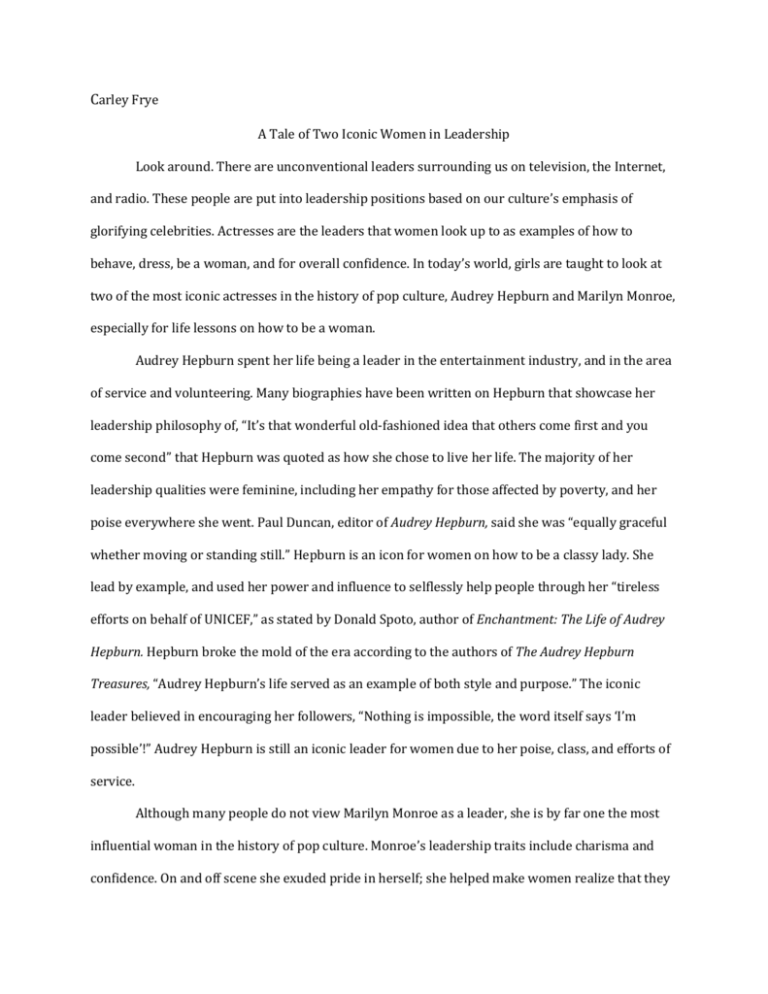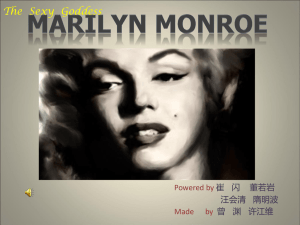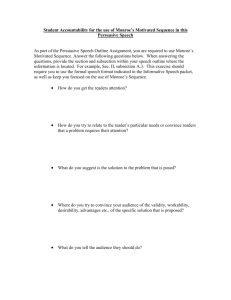The Tale of Two Leaders
advertisement

Carley Frye A Tale of Two Iconic Women in Leadership Look around. There are unconventional leaders surrounding us on television, the Internet, and radio. These people are put into leadership positions based on our culture’s emphasis of glorifying celebrities. Actresses are the leaders that women look up to as examples of how to behave, dress, be a woman, and for overall confidence. In today’s world, girls are taught to look at two of the most iconic actresses in the history of pop culture, Audrey Hepburn and Marilyn Monroe, especially for life lessons on how to be a woman. Audrey Hepburn spent her life being a leader in the entertainment industry, and in the area of service and volunteering. Many biographies have been written on Hepburn that showcase her leadership philosophy of, “It’s that wonderful old-fashioned idea that others come first and you come second” that Hepburn was quoted as how she chose to live her life. The majority of her leadership qualities were feminine, including her empathy for those affected by poverty, and her poise everywhere she went. Paul Duncan, editor of Audrey Hepburn, said she was “equally graceful whether moving or standing still.” Hepburn is an icon for women on how to be a classy lady. She lead by example, and used her power and influence to selflessly help people through her “tireless efforts on behalf of UNICEF,” as stated by Donald Spoto, author of Enchantment: The Life of Audrey Hepburn. Hepburn broke the mold of the era according to the authors of The Audrey Hepburn Treasures, “Audrey Hepburn’s life served as an example of both style and purpose.” The iconic leader believed in encouraging her followers, “Nothing is impossible, the word itself says ‘I’m possible’!” Audrey Hepburn is still an iconic leader for women due to her poise, class, and efforts of service. Although many people do not view Marilyn Monroe as a leader, she is by far one the most influential woman in the history of pop culture. Monroe’s leadership traits include charisma and confidence. On and off scene she exuded pride in herself; she helped make women realize that they should be their own person, and not be defined by men. Marilyn Monroe’s philosophy can be summed up by her quote, “I don’t mind living in a man’s world, as long as I can be a woman in it.” Women still look to Monroe as an iconic leader for women, because she was once a follower. Born Norma Jeane in 1926, she later changed her name to Marilyn Monroe for Hollywood, but she always had the connection with women of what it is like to be average. She used her power and influence to empower her female followers. She said, “We are all of us stars, and we deserve to twinkle.” Her charisma inspired women, and has lead to her being titled “one of the most fascinating icons of the 20th century,” according to Randy Taraborrelli, author of The Secret Life of Marilyn Monroe. Ben Hecht, author of My Story: Illustrated Edition, the finished autobiography that was started by Marilyn Monroe, says Monroe was “a gifted, intelligent, vulnerable woman who was far more complex than the unwitting sex siren she portrayed on screen.” Monroe used her gift as a channel for women to hear her, and her intelligence to convey how to be a strong woman with her followers. Her vulnerability is what made women emotionally connect with the message she was sending. Marilyn Monroe remains an iconic leader of feminine strength and empowerment. Both Audrey Hepburn and Marilyn Monroe taught women their philosophies that can still be applied today. Girls all over college campuses have posters of these iconic women hanging in their dorms, and follow the teaching of these leaders. Audrey Hepburn taught us to act classy at all times, and selflessly give to others. Marilyn Monroe conveyed that there is strength and influence in womanhood. These ideals combine make courageous and caring women that can change the world. In today’s culture of sex and extravagance, women need to look to the old-Hollywood iconic leaders that taught us to live life in a glamorous and classy way that makes us proud to be who we are, and to use our positions of leadership to help others.



